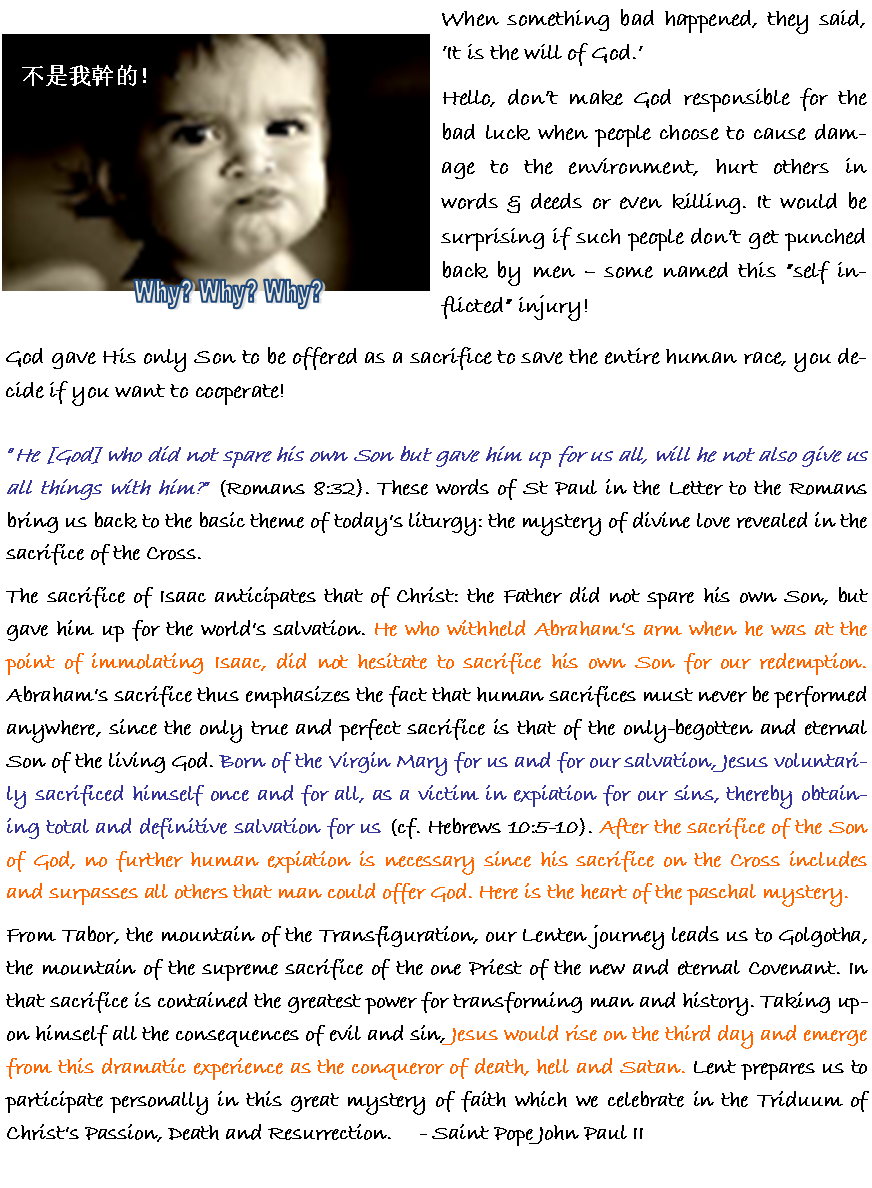|
155 |
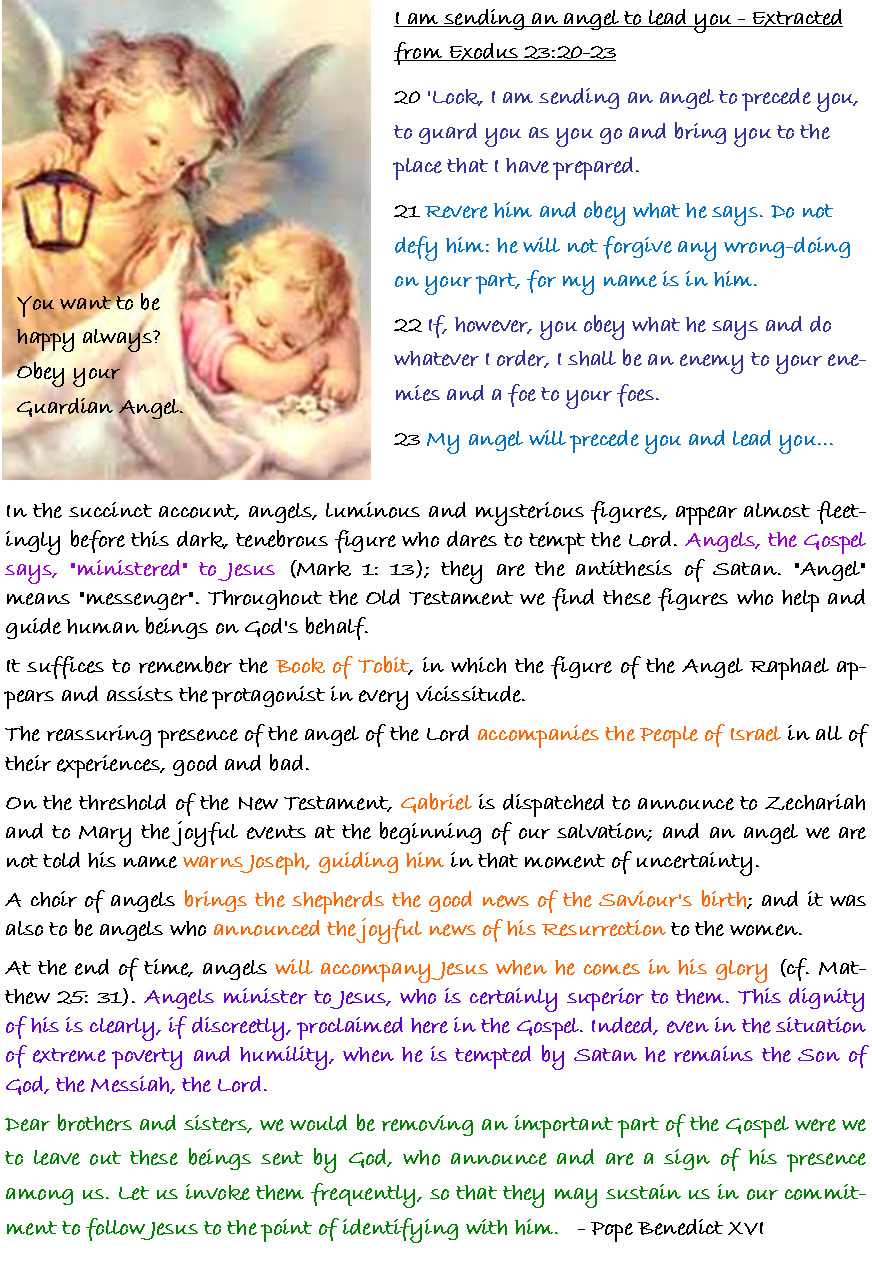
|
BENEDICT XVI ANGELUS Saint Peter's Square
Dear Brothers and Sisters,
Today is the First Sunday of Lent and the Gospel, in the sober and concise style of St Mark, introduces us into the atmosphere of this liturgical season: "The Spirit drove Jesus out into the desert, and he remained in the desert for forty days, tempted by Satan" (Mark 1: 12). In the Holy Land the Judean desert, which lies to the west of the River Jordan and the Oasis of Jericho, rises over stony valleys to reach an altitude of about 1,000 metres at Jerusalem. After receiving Baptism from John, Jesus entered that lonely place, led by the Holy Spirit himself who had settled upon him, consecrating him and revealing him as the Son of God. In the desert, a place of trial as the experience of the People of Israel shows, the dramatic reality of the kenosis, the self-emptying of Christ who had stripped himself of the form of God (cf. Philippians 2: 6-7), appears most vividly. He who never sinned and cannot sin submits to being tested and can therefore sympathize with our weaknesses (cf. Hebrews 4: 15). He lets himself be tempted by Satan, the enemy, who has been opposed to God's saving plan for humankind from the outset.
In the succinct account, angels, luminous and mysterious figures, appear almost fleetingly before this dark, tenebrous figure who dares to tempt the Lord. Angels, the Gospel says, "ministered" to Jesus (Mark 1: 13); they are the antithesis of Satan. "Angel" means "messenger". Throughout the Old Testament we find these figures who help and guide human beings on God's behalf. It suffices to remember the Book of Tobit, in which the figure of the Angel Raphael appears and assists the protagonist in every vicissitude. The reassuring presence of the angel of the Lord accompanies the People of Israel in all of their experiences, good and bad. On the threshold of the New Testament, Gabriel is dispatched to announce to Zechariah and to Mary the joyful events at the beginning of our salvation; and an angel we are not told his name warns Joseph, guiding him in that moment of uncertainty. A choir of angels brings the shepherds the good news of the Saviour's birth; and it was also to be angels who announced the joyful news of his Resurrection to the women. At the end of time, angels will accompany Jesus when he comes in his glory (cf. Matthew 25: 31). Angels minister to Jesus, who is certainly superior to them. This dignity of his is clearly, if discreetly, proclaimed here in the Gospel. Indeed, even in the situation of extreme poverty and humility, when he is tempted by Satan he remains the Son of God, the Messiah, the Lord.
Dear brothers and sisters, we would be removing an important part of the Gospel were we to leave out these beings sent by God, who announce and are a sign of his presence among us. Let us invoke them frequently, so that they may sustain us in our commitment to follow Jesus to the point of identifying with him. Let us ask them, especially today, to watch over me and my collaborators in the Roman Curia; this afternoon we shall be beginning a week of Spiritual Exercises, as we do every year. Mary, Queen of Angels, pray for us! ---------------------------------------------
After the Angelus:
I am happy to greet all the English-speaking visitors present at today's Angelus prayer. On this First Sunday of Lent, the Gospel of St Mark speaks of Jesus being led into the desert by the Holy Spirit, tempted by Satan and assisted by the angels. Let us pray that our Lenten journey will strengthen us in the struggle against all forms of temptation. Upon all of you I invoke God's abundant Blessings, and I wish you a pleasant Sunday and a happy stay in Rome!
After the Angelus the Holy Father made a special appeal for the workers of the Fiat factory in Pomigliano d'Arco:
Priority should be given to workers and their families. |
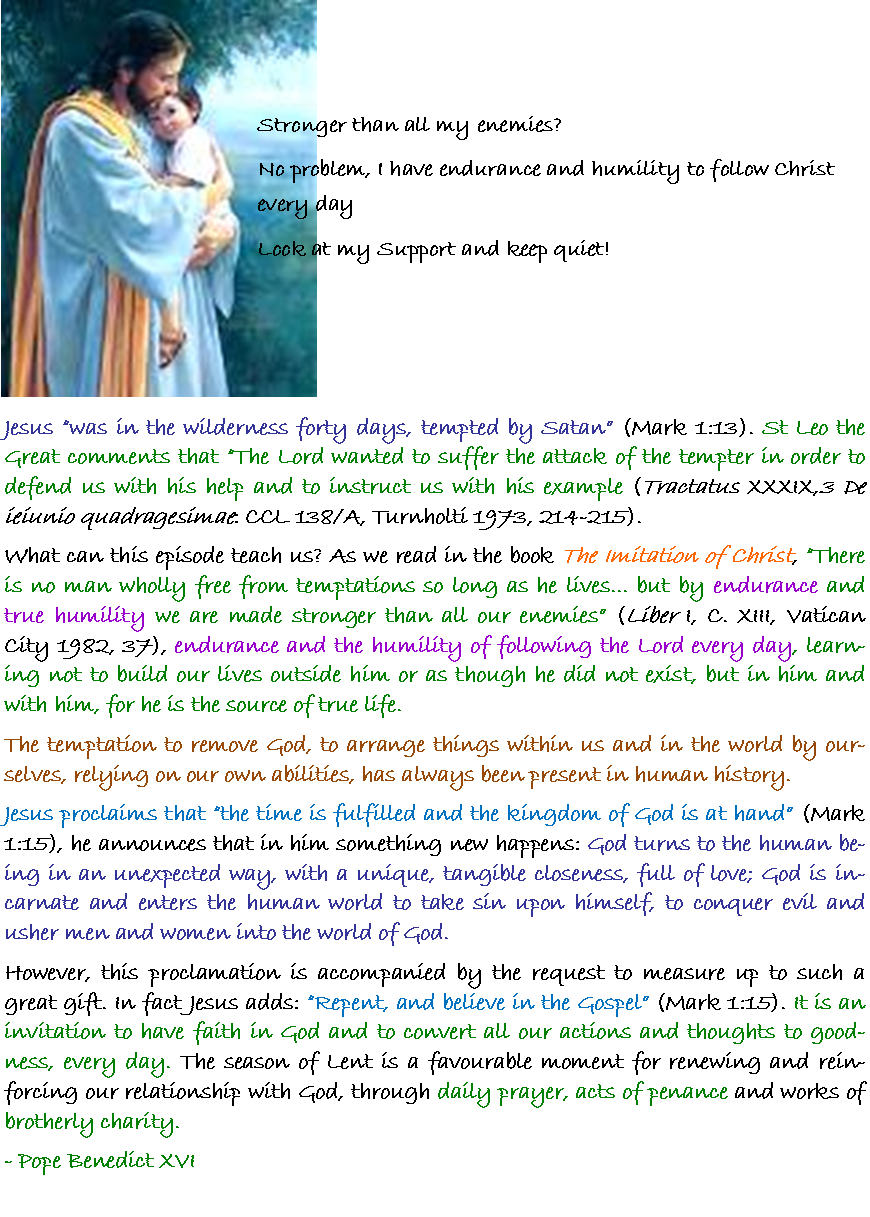
|
BENEDICT XVI ANGELUS St. Peter's Square [Video]
Dear Brothers and Sisters,
On this First Sunday of Lent we meet Jesus who, after receiving Baptism from John the Baptist in the River Jordan (cf. Mark 1:9), is subjected to temptation in the wilderness (cf. Mark 1:12-13). St Mark’s concise narrative lacks the details we read in the other two Gospels of Matthew and Luke. The wilderness referred to has various meanings. It can indicate the state of abandonment and loneliness, the “place” of human weakness, devoid of support and safety, where temptation grows stronger.
However, it can also indicate a place of refuge and shelter — as it was for the People of Israel who had escaped from slavery in Egypt — where it is possible to experience God’s presence in a special way. Jesus “was in the wilderness forty days, tempted by Satan” (Mark 1:13). St Leo the Great comments that “The Lord wanted to suffer the attack of the tempter in order to defend us with his help and to instruct us with his example (Tractatus XXXIX,3 De ieiunio quadragesimae: CCL 138/A, Turnholti 1973, 214-215).
What can this episode teach us? As we read in the book The Imitation of Christ, “There is no man wholly free from temptations so long as he lives... but by endurance and true humility we are made stronger than all our enemies” (Liber I, C. XIII, Vatican City 1982, 37), endurance and the humility of following the Lord every day, learning not to build our lives outside him or as though he did not exist, but in him and with him, for he is the source of true life.
The temptation to remove God, to arrange things within us and in the world by ourselves, relying on our own abilities, has always been present in human history.
Jesus proclaims that “the time is fulfilled and the kingdom of God is at hand” (Mark 1:15), he announces that in him something new happens: God turns to the human being in an unexpected way, with a unique, tangible closeness, full of love; God is incarnate and enters the human world to take sin upon himself, to conquer evil and usher men and women into the world of God.
However, this proclamation is accompanied by the request to measure up to such a great gift. In fact Jesus adds: “Repent, and believe in the Gospel” (Mark 1:15). It is an invitation to have faith in God and to convert all our actions and thoughts to goodness, every day. The season of Lent is a favourable moment for renewing and reinforcing our relationship with God, through daily prayer, acts of penance and works of brotherly charity.
Let us fervently beg Mary Most Holy to accompany us on our Lenten journey with her protection and to help us to impress the words of Jesus Christ in our hearts and in our lives so as to convert to him. In addition, I entrust to your prayers the week of Spiritual Exercises which I shall begin this evening with my co-workers in the Roman Curia. ----------------------------------------------------------------------------------
After the Angelus:
I am pleased to greet all the English-speaking visitors and pilgrims present for this moment of prayer. In these first days of Lent, I invite you to embrace the spirit of this holy season, through prayer, fasting and almsgiving. As we do so, may the Lord accompany us, so that, at the end of Lent, we may worthily celebrate his victory on the cross. God bless all of you abundantly! I wish you all a good Sunday. |
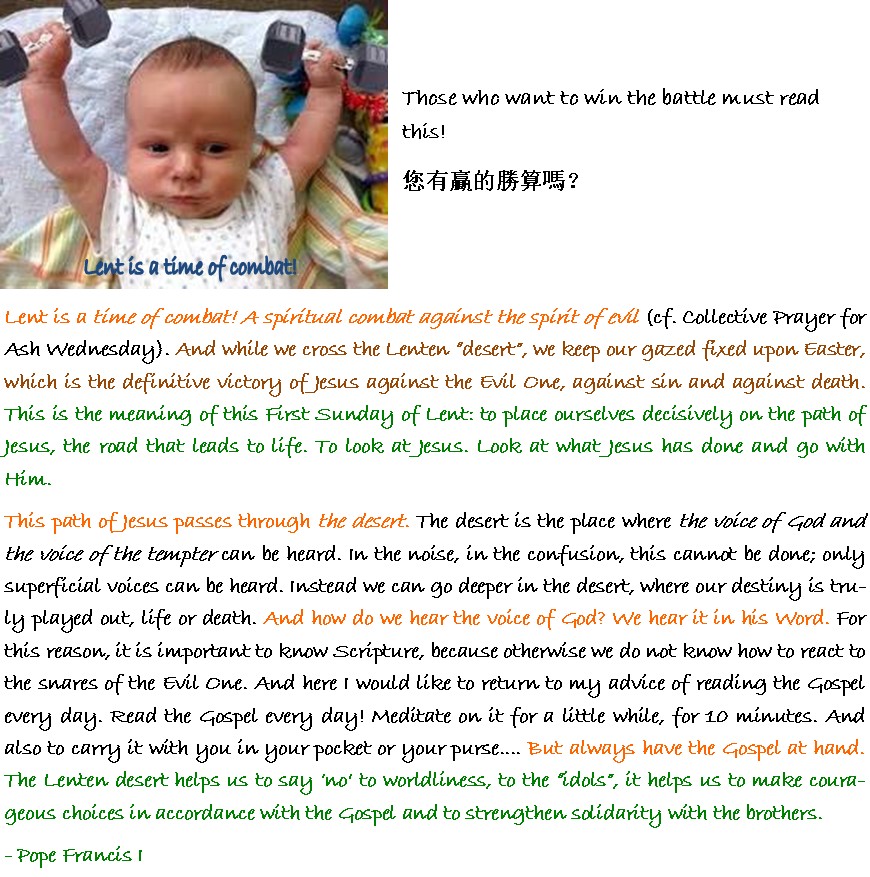
|
POPE FRANCIS ANGELUS Saint Peter's Square
Dear Brothers and Sisters, Good morning!
Last Wednesday, with the rite of Ashes, Lent began, and today is the First Sunday of this Liturgical Season which refers to the 40 days Jesus spent in the desert, after his Baptism in the River Jordan. St Mark writes in today’s Gospel: “The Spirit immediately drove him out into the wilderness. And he was in the wilderness forty days, tempted by Satan; and he was with the wild beasts; and the angels ministered to him” (1:12-13). With these simple words the Evangelist describes the trials willingly faced by Jesus before he began his messianic mission. It is a trial from which the Lord leaves victorious and which prepares him to proclaim the Gospel of the Kingdom of God. In these 40 days of solitude, he confronts Satan “body to body”, He unmasks his temptations and conquers him. And through Him, we have all conquered, but we must protect this victory in our daily lives.
The Church reminds us of that mystery at the beginning of Lent, so that it may give us the perspective and the meaning of this Time, which is a time of combat. Lent is a time of combat! A spiritual combat against the spirit of evil (cf. Collective Prayer for Ash Wednesday). And while we cross the Lenten “desert”, we keep our gazed fixed upon Easter, which is the definitive victory of Jesus against the Evil One, against sin and against death. This is the meaning of this First Sunday of Lent: to place ourselves decisively on the path of Jesus, the road that leads to life. To look at Jesus. Look at what Jesus has done and go with Him.
This path of Jesus passes through the desert. The desert is the place where the voice of God and the voice of the tempter can be heard. In the noise, in the confusion, this cannot be done; only superficial voices can be heard. Instead we can go deeper in the desert, where our destiny is truly played out, life or death. And how do we hear the voice of God? We hear it in his Word. For this reason, it is important to know Scripture, because otherwise we do not know how to react to the snares of the Evil One. And here I would like to return to my advice of reading the Gospel every day. Read the Gospel every day! Meditate on it for a little while, for 10 minutes. And also to carry it with you in your pocket or your purse.... But always have the Gospel at hand. The Lenten desert helps us to say ‘no’ to worldliness, to the “idols”, it helps us to make courageous choices in accordance with the Gospel and to strengthen solidarity with the brothers.
Now let us enter into the desert without fear, because we are not alone: we are with Jesus, with the Father and with the Holy Spirit. In fact, as it was for Jesus, it is the Holy Spirit who guides us on the Lenten journey; that same Spirit that descended upon Jesus and that has been given to us in Baptism.
Lent, therefore is an appropriate time that should lead us to be ever more aware of how much the Holy Spirit, received in Baptism, has worked and can work in us. And at the end of the Lenten itinerary, at the Easter Vigil, we can renew with greater awareness the Baptismal covenant and the commitments that flow from it.
May the Blessed Virgin, model of docility to the Spirit, help us to let ourselves be led by Him, who wishes to make each of us a “new creature”.
To her I entrust, in particular, the week of Spiritual Exercises, that will begin this afternoon, and in which I shall participate with my collaborators of the Roman Curia. I ask that you pray for us, that in this “desert” of the Spiritual Exercises, we may listen to the voice of Jesus, and also correct the many defects that we have. And also to confront the temptations that attack us every day. I ask you therefore to accompany us with your prayers. -----------------------------------------------------------
After the Angelus:
Dear brothers and sisters, I cordially greet the families, the parish groups, the Associations and all the pilgrims from Rome, from Italy and from various countries. I greet the faithful from Naples, Cosenza and Verona, and the youth from Seregno who have come for the profession of faith. Lent is a journey of conversion that puts the heart at its centre. Our heart must convert to the Lord. Therefore, in this First Sunday, I thought to give those of you who are here in the Square a small booklet entitled “Custodisci il cuore” (“Guard the heart”). It’s this one. [he holds up the booklet] This book contains some of Jesus’s teaching and the essential contents of our faith, for example the seven Sacraments, the gifts of the Holy Spirit, the Ten Commandments, the Virtues, the works of mercy, etc…
The volunteers, among whom there are many homeless people who have come on pilgrimage, will now distribute them. And as always, today too, here in the Square, are those who are in need, the same who bring us a great wealth: the wealth of our doctrine, to guard your heart. Each one of you take a booklet and carry it with you, as a help for spiritual conversion and growth that always starts from the heart: the place where the match of daily choices between good and evil is played out, between worldliness and the Gospel, between indifference and sharing. Humanity is in need of justice, of peace, of love and will have it only by returning with their whole heart to God, who is the source of it all. Take the book and read it.
I wish you all a Good Sunday. Please, especially in this week of [Spiritual] Exercises do not forget to pray for me. Have a good lunch and Arrivederci.
Acknowledgment: We thank the Vatican Publisher for allowing us to publish the Homilies of Saint Pope John Paul II, Pope Benedict XVI & Pope Francis I, so that they could be accessed by more people all over the world; as a source of God’s encouragements to all of us. 3 April 2015, 3:00pm |
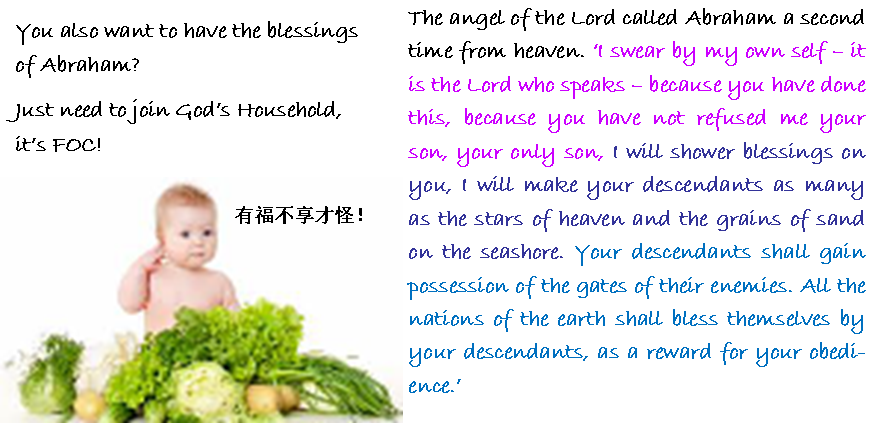
|
See our record on the Blessings of Abraham. Second Sunday of Lent, First Reading: Extracted from the Book of Genesis: 22:1-2, 9-13, 15-18 God put Abraham to the test. ‘Abraham, Abraham’ he called. ‘Here I am’ he replied. ‘Take your son,’ God said ‘your only child Isaac, whom you love, and go to the land of Moriah. There you shall offer him as a burnt offering, on a mountain I will point out to you.’ When they arrived at the place God had pointed out to him, Abraham built an altar there, and arranged the wood. Then he bound his son Isaac and put him on the altar on top of the wood. Abraham stretched out his hand and seized the knife to kill his son. But the angel of the Lord called to him from heaven. ‘Abraham, Abraham’ he said. ‘I am here’ he replied. ‘Do not raise your hand against the boy’ the angel said. ‘Do not harm him, for now I know you fear God. You have not refused me your son, your only son.’ Then looking up, Abraham saw a ram caught by its horns in a bush. Abraham took the ram and offered it as a burnt-offering in place of his son. The angel of the Lord called Abraham a second time from heaven. ‘I swear by my own self – it is the Lord who speaks – because you have done this, because you have not refused me your son, your only son, I will shower blessings on you, I will make your descendants as many as the stars of heaven and the grains of sand on the seashore. Your descendants shall gain possession of the gates of their enemies. All the nations of the earth shall bless themselves by your descendants, as a reward for your obedience.’ |

|
Kill the Virtuous so that he could be kicked out of our minds and our lives? What a stupid idea! See Wisdom 5 (Encouragements-63) and don’t cry when it’s too late! You know killing could also mean causing damage or harm financially, psychologically or politically. You decide what the list should be based on the News Reports! |
|
Second Sunday of Lent, Responsorial: Psalm 116:10,15-19 Response: I will walk in the presence of the Lord in the land of the living.
I trusted, even when I said: ‘I am sorely afflicted,’ O precious in the eyes of the Lord is the death of his faithful.
Your servant, Lord, your servant am I; you have loosened my bonds. A thanksgiving sacrifice I make; I will call on the Lord’s name.
My vows to the Lord I will fulfil before all his people, in the courts of the house of the Lord, in your midst, O Jerusalem. |

|
Second Sunday of Lent, Second Reading: Extracted from the letter of Saint Paul to the Romans 8:31-34 With God on our side who can be against us? Since God did not spare his own Son, but gave him up to benefit us all, we may be certain, after such a gift, that he will not refuse anything he can give. Could anyone accuse those that God has chosen? When God acquits, could anyone condemn? Could Christ Jesus? No! He not only died for us – he rose from the dead, and there at God’s right hand he stands and pleads for us.
Gospel Acclamation Matthew 17:5 Glory and praise to you, O Christ! From the bright cloud the Father’s voice was heard: ‘This is my Son, the Beloved. Listen to him.’ Glory and praise to you, O Christ! |
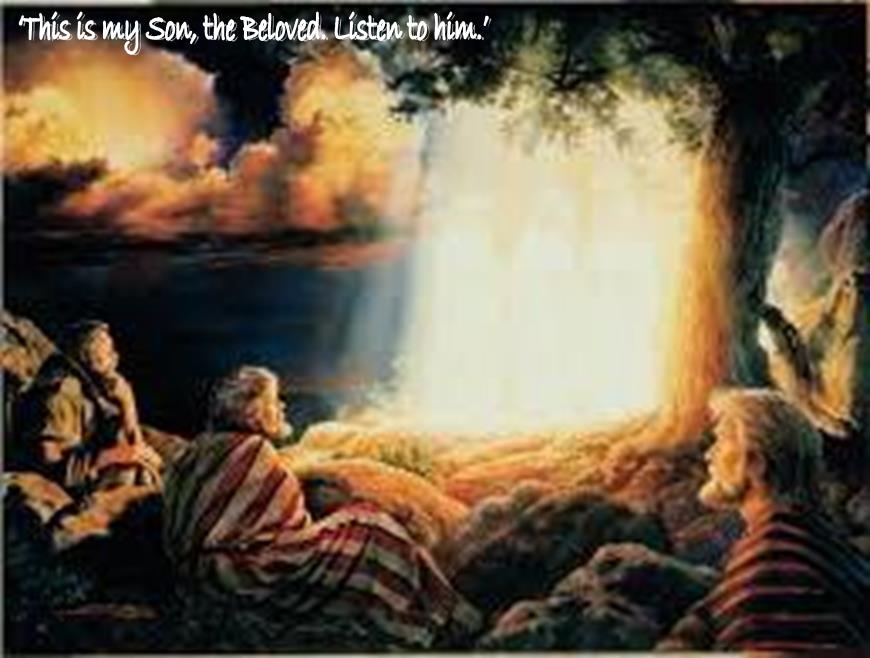
|
Second Sunday of Lent, Gospel Reading: Extracted from the holy Gospel according to Mark 9:2-10 Jesus took with him Peter and James and John and led them up a high mountain where they could be alone by themselves. There in their presence he was transfigured: his clothes became dazzlingly white, whiter than any earthly bleacher could make them. Elijah appeared to them with Moses; and they were talking with Jesus. Then Peter spoke to Jesus: ‘Rabbi,’ he said ‘it is wonderful for us to be here; so let us make three tents, one for you, one for Moses and one for Elijah.’ He did not know what to say; they were so frightened. And a cloud came, covering them in shadow; and there came a voice from the cloud, ‘This is my Son, the Beloved. Listen to him.’ Then suddenly, when they looked round, they saw no one with them any more but only Jesus. As they came down from the mountain he warned them to tell no one what they had seen, until after the Son of Man had risen from the dead. They observed the warning faithfully, though among themselves they discussed what ‘rising from the dead’ could mean.
Sharing: It was the 2nd Sunday of Lent on 1 March 2015. The Readings that were read in the Eucharistic Celebrations all over the world on the same day are shown above: 1st Reading: Genesis: 22:1-2, 9-13, 15-18, Responsorial: Psalm 116:10, 15-19, 2nd Reading: Romans 8:31-34 & Gospel Reading: Mark 9:2-10. We have extracted the Homilies Blessed Pope John Paul II, Pope Benedict XVI & Pope Francis I based on the aforesaid Readings to share with you, so that you could similarly be encouraged: |
|
EUCHARISTIC CELEBRATION at the Roman parish HOMILY OF POPE JOHN PAUL II Second Sunday of Lent
1. “This is my beloved Son; listen to him” (Mark 9:7).
In the context of the Lord's Transfiguration, today once again we listen to the words that echoed at the moment of Jesus’ baptism in the Jordan (cf. Matthew 3:17). “Jesus took with him Peter and James and John ... and he was transfigured before them. And there appeared to them Elijah with Moses; and they were talking to Jesus. And Peter said to Jesus, ‘Master, it is well that we are here; let us make three booths, one for you and one for Moses and one for Elijah’” (Mark 9:2-5). At that very moment a voice was heard: “This is my beloved Son; listen to him” (Mark 9:7).
This extraordinary manifestation of Jesus’ divine son-ship did not last long. When the Apostles looked up again, they saw no one else but Jesus, who “as they were coming down the mountain”, the Evangelist continues, “charged them to tell no one what they had seen, until the Son of Man should have risen from the dead” (Mark 9:9).
Thus on this Second Sunday of Lent, together with the Apostles we hear the announcement of the Resurrection. We hear it as we set out with them on the way to Jerusalem, where we will relive the mystery of the Lord’s Passion and Death. The fasting and penance of this sacred season are oriented precisely to this event which is the key to the whole economy of salvation.
2. The Transfiguration of the Lord, which tradition claims took place on Mount Tabor, gives prominence to the person and work of God the Father, who is really and invisibly present beside his Son. This explains why that important Old Testament episode, which gives special emphasis to fatherhood, is used as a backdrop of the Gospel for the Transfiguration.
In fact, the first reading taken from the Book of Genesis, recalls Abraham’s sacrifice. He had a son, Isaac, born to him in his old age. He was the son who had been promised. But one day Abraham receives from God the order to offer him in sacrifice. The elderly patriarch finds himself facing the prospect of a sacrifice that for him, a father, is certainly the greatest imaginable. Nevertheless, he does not hesitate even for an instant, and after making the necessary preparations, sets out with Isaac for the appointed place. He builds an altar, sets the wood on it and, binding the boy, takes the knife to sacrifice him. Only then is he prevented by an order from on high: “Do not lay your hand on the lad or do anything to him; for now I know that you fear God, seeing you have not withheld your son, your only son, from me” (Genesis 22:12).
There is something disturbing about this event in which a father’s faith and trust in God reach their apex. Rightly St Paul calls Abraham the “father of all believers” (cf. Romans 4:11, 17). The Jewish and Christian religions refer to his faith. The Koran also recognizes the figure of Abraham. The faith of the father of believers is a mirror in which the mystery of God is reflected, a mystery of love that unites the Father and the Son.
3. Dear brothers and sisters of Holy Cross Parish on Via Flaminia! It is a great joy for me to celebrate Mass here today in this lovely church, built at the wish of my venerable predecessor St Pius X, and visited in 1964 by the Servant of God Pope Paul VI and raised by him to the rank of a minor basilica. I greet the Cardinal Vicar. I greet Cardinal Baum, titular of the basilica, the Auxiliary Bishop in charge of this area, the parish priest, Fr Carlo Zanini, the parochial vicars and the Stigmatine Fathers, who have been entrusted with the pastoral care of your community from the beginning. In carrying out their ministry here, many of them have had a profound influence on parish life. Among the many who deserve particular mention, I would like to name, in addition to Fr Emilio Recchia, your community’s parish priest for many years, Fr Cornelio Fabro, the well-known philosopher and theologian, who died two years ago.
4. Dear brothers and sisters, I know that the recently begun city mission has also found ready and generous support in your parish. I express my appreciation for your availability and I urge you to be witnesses to the Gospel in this neighbourhood which, like other areas of Rome, is undergoing rapid social change.
However, for the proclamation to be effective, believers must be deeply united and work together. Therefore, with this in mind, make the most of the many different forms of apostolic zeal present here. I am thinking of the religious institutes of the Brothers of the Christian Schools, the Sisters of St Elizabeth, the Daughters of Mercy and the Apostles of the Interior Life, as well as the numerous parish groups involved in the various areas of catechesis, the liturgy and charity.
I am thinking of the parish’s recreational facilities which, once they have been remodeled, will be a privileged place for formative meetings for the whole neighbourhood. May the Church and parish institutions increasingly become a reference point for all. May your community be ready to welcome every person, especially the many Filippino and Peruvian immigrants who often live here like “parishioners without a home in the parish”.
5. “He [God] who did not spare his own Son but gave him up for us all, will he not also give us all things with him?” (Romans 8:32). These words of St Paul in the Letter to the Romans bring us back to the basic theme of today’s liturgy: the mystery of divine love revealed in the sacrifice of the Cross.
The sacrifice of Isaac anticipates that of Christ: the Father did not spare his own Son, but gave him up for the world’s salvation. He who withheld Abraham’s arm when he was at the point of immolating Isaac, did not hesitate to sacrifice his own Son for our redemption. Abraham’s sacrifice thus emphasizes the fact that human sacrifices must never be performed anywhere, since the only true and perfect sacrifice is that of the only-begotten and eternal Son of the living God. Born of the Virgin Mary for us and for our salvation, Jesus voluntarily sacrificed himself once and for all, as a victim in expiation for our sins, thereby obtaining total and definitive salvation for us (cf. Hebrews 10:5-10). After the sacrifice of the Son of God, no further human expiation is necessary since his sacrifice on the Cross includes and surpasses all others that man could offer God. Here is the heart of the paschal mystery.
Continue next page ...
12 April 2015, 3:00pm SGT |
